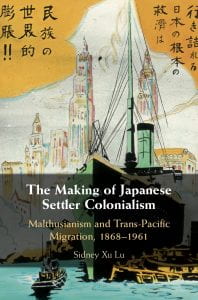The Making of Japanese Settler Colonialism: Malthusianism and Trans-Pacific Migration, 1868-1961
 The Making of Japanese Settler Colonialism: Malthusianism and Trans-Pacific Migration, 1868-1961 (Cambridge University Press, 2019) is a study of the relationship between population, emigration and colonial expansion in the history of modern Japan. The book is a Winner of MSU TOME Award for Open-Access Publication, and is longlisted for ICAS Book Prize in the Humanities 2021. Its printed and kindle versions are available for purchase via Amazon and it is also available as an open-access e-book via Cambridge Core.
The Making of Japanese Settler Colonialism: Malthusianism and Trans-Pacific Migration, 1868-1961 (Cambridge University Press, 2019) is a study of the relationship between population, emigration and colonial expansion in the history of modern Japan. The book is a Winner of MSU TOME Award for Open-Access Publication, and is longlisted for ICAS Book Prize in the Humanities 2021. Its printed and kindle versions are available for purchase via Amazon and it is also available as an open-access e-book via Cambridge Core.
The book explains how the discourse of overpopulation emerged in Meiji Japan and how it was appropriated by different generations of Japanese expansionists to justify Japan’s migration-driven expansion in Asia, Hawaii, North and South America from the beginning of the Meiji era to the 1960s. The study defines this overpopulation discourse as “Malthusian expansionism”. It was a set of ideas that demanded additional land abroad to accommodate the supposed surplus domestic population on the one hand and emphasized the necessity of national population growth on the other. As two sides of the same coin, these two seemingly contradictory strands of ideas worked in tandem to constitute the logic of Malthusian expansionism. It rationalized overseas emigration as both an ideal method to diffuse domestic tensions supposedly caused by overpopulation and an effective means for the empire to pursue wealth and power abroad.
At a concrete level, focusing on the discourse of overpopulation, this study examines Japanese expansion in a way that transcends the geographical and temporal boundaries of the Japanese colonial empire. It delineates ideological ties, human connections and institutional continuities between Japanese colonial migration in Asia and Japanese migration to Hawaii and North and South America from early Meiji to two decades after WWII. At a more theoretical level, this trans-Pacific study of Japanese expansion challenges the conceptual division between “migrants” and “settlers” in settler colonial studies, a conventionally Anglo-centered field of inquiry. By revealing the overlaps and intersections between the experiences of migration and colonial expansion, it reconfigures the scope, logic, and significance of settler colonialism in world history. It also sheds new light on the relationship between life and land and between bio-politics and geo-politics in the logic of modern imperialism.

